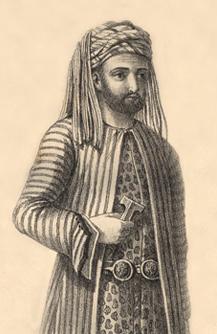



Agha (Turkish: ağa;[2] Ottoman Turkish: آغا; Persian: آقا, romanized: āghā; "chief, master, lord"[3]) is an honorific title for a civilian or officer, or often part of such title. In the Ottoman times, some court functionaries and leaders of organizations like bazaar or the janissary units were entitled to the agha title. In rural communities, this term is used for people who own considerable lands and are influential in their community. Regardless of a rural community, this title is also used for any male who is influential or respected.[2]
The word agha entered English from Turkish,[3] and the Turkish word comes from the Old Turkic aqa, meaning "elder brother".[4] It is an equivalent of Mongolian word aqaoraka.[5]
"Agha" is nowadays used as a common Persian honorific title for men, the equivalent of "mister" in English.[6] The corresponding honorific term for women is khanum which is also of Turkic origin.